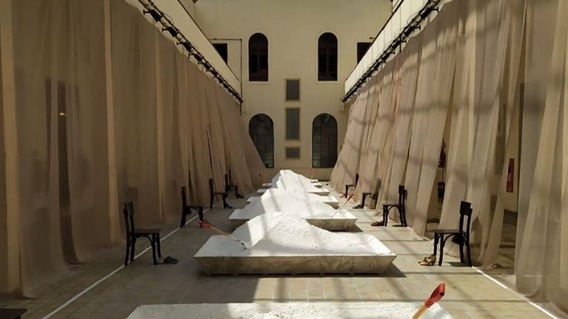
[IN]VISÍVEIS
Polacas: Memória e Resistência
Oficina Cultural Oswald de Andrade
São Paulo, SP
2019
Polacas: Memória e Resistência
"A partir de 1867 chegaram ao Brasil milhares das assim chamadas “polacas”: mulheres na sua maioria judias que em parte foram trazidas pela Organização para a Ajuda Mútua de Varsóvia, nome cínico, depois alterado para Zwi Migdal. Elas vinham servir de trabalhadoras do sexo em prostíbulos de cidades como Rio de Janeiro, Santos e São Paulo. Até os anos 1930 centenas desses prostíbulos foram criados então no Brasil.
Expelidas das pequenas aldeias judaicas da Europa Oriental pela pobreza e pelas ondas de ataques antissemitas, essas “polacas” (nem todas, vale lembrar, eram realmente judias e polonesas) alimentaram bordéis também em Nova York, na África do Sul e sobretudo em Buenos Aires, onde existiram cerca de 3.000 desses estabelecimentos com “polacas”.
Estigmatizadas pela sociedade e pela comunidade judaica, elas tiveram que criar suas Sinagogas e cemitérios. Sem direito a uma vida digna, era-lhes também roubada a possibilidade de um enterro digno, conforme às leis judaicas.
A instalação [In]visíveis: Polacas - memoria e resistência, das artistas Eva Castiel, Fanny Feigenson e Fúlvia Molina procura lançar luz sobre esse passado esquecido e recalcado. A arte surge como dispositivo mnemônico com a capacidade de promover a restituição simbólica de vidas precarizadas, cujos corpos serviam de entretenimento em meio à implantação do capitalismo. Além das instalações na Oficina Cultural Oswald de Andrade, faz parte da intervenção dessas artistas visitas guiadas à antiga Rua Itaboca, lugar de memória das “polacas”, e uma mesa-redonda com debates em um “Sábado Resistente”, no Memorial da Resistência.
Em uma instalação sonora em iídiche escutamos as inscrições das lápides das 48 “polacas” sepultadas no Cemitério Israelita de Cubatão, com nome, local e data de nascimento, local e data de falecimento e mensagens de familiares e amigos. Assim imergimos nessa língua que foi tentativamente dizimada pelo nazismo e que era em boa parte a língua dessas mulheres marcadas pelo estigma dos preconceitos. Sete caixas de masseira de obra cheias de cal e com pás, ladeadas de cadeiras e pares de sapato femininos remetem tanto a esses corpos que não tiveram direito à dignidade, em vida e depois da morte, como ao esquecimento dessas histórias no feminino, que deveriam compor parte de nossa memória coletiva.
Restituir a memória dessas mulheres hoje, quando o feminicídio se torna um crime banalizado e transformado em parte de nossa necropolítica é um gesto de coragem que nos revigora para a resistência cotidiana. A arte do “desesquecimento” de Eva, Fanny e Fúlvia reafirma a capacidade empática e crítica do campo estético, deixando claro que a arte é parte essencial da luta política hoje."
Márcio Seligmann-Silva
Curador
Professor titular de Teoria Literária
Instituto de Estudos da Linguagem, IEL
Universidade Estadual de Campinas, UNICAMP
[In]visible
Polacas: Memory and Resistance
"From 1867 thousands of so-called “Polacas”, Polish women, arrived in Brazil: mostly Jewish women who were partly brought by the Warsaw Mutual Aid Organization, a cynical name, later changed to Zwi Migdal. They came to serve sex as workers in brothels in cities like Rio de Janeiro, Santos and São Paulo. Until the 1930s, hundreds of such brothels were created in Brazil.
Expelled from Eastern Europe small Jewish villages by poverty and waves of anti-Semitic attacks, these "Polacas" (not every, it is worth remembering, were actually Jewish and Polish) fed brothels in New York, South Africa and especially Buenos Aires, where there were about 3,000 of these establishments.
Stigmatized by society and the Jewish community, they had to create their own Synagogues and cemeteries. Without the right to a dignified life, they were also robbed of the possibility of a dignified burial, according to Jewish laws.
The installation (In)visible: Polacas - memory and resistance, by artists Eva Castiel, Fanny Feigenson and Fulvia Molina seeks to shed light on this forgotten and repressed past. Art emerges as a mnemonic device with the hability to promote the symbolic restitution of precarious lives, whose bodies served as entertainment amid the capitalism implementation. In addition to the installations at the Oficina Cultural Oswald de Andrade, part of these artists intervention is a guided visit to old Rua Itaboca, one of the “Polacas” places of memory, and a round table with debates on a “Resistant Saturday”, at the Memorial da Resistência.
In a Yiddish sound installation, we heard the inscriptions of the tombstones of the 48 “Polacas” buried in the Israelite Cemetery of Cubatão, with name, place and date of birth, place and date of death and messages from family and friends. So we immersed ourselves in that language that was tentatively decimated by Nazism and that was largely the language spoken by these women marked by the stigma of prejudice. Seven masonry boxes filled with lime and with shovels, flanked by chairs and female shoes that refer so much to those bodies that were not entitled to dignity, in life and after death, as to the forgetfulness of these stories in the feminine, which should be part of our collective memory.
Restoring the memory of these women today, when femicide becomes a trivial crime and transformed in our necropolitics, is a gesture of courage that invigorates us for our everyday resistance. The art of “des-oblivion” by Eva, Fanny and Fulvia reaffirms the empathic and critical capacity of the aesthetic field, making it clear that art is an essential part of today’s political struggle."
Márcio Seligmann-Silva






